Tesla Model S Tinting Prices

Model S 3 X Y
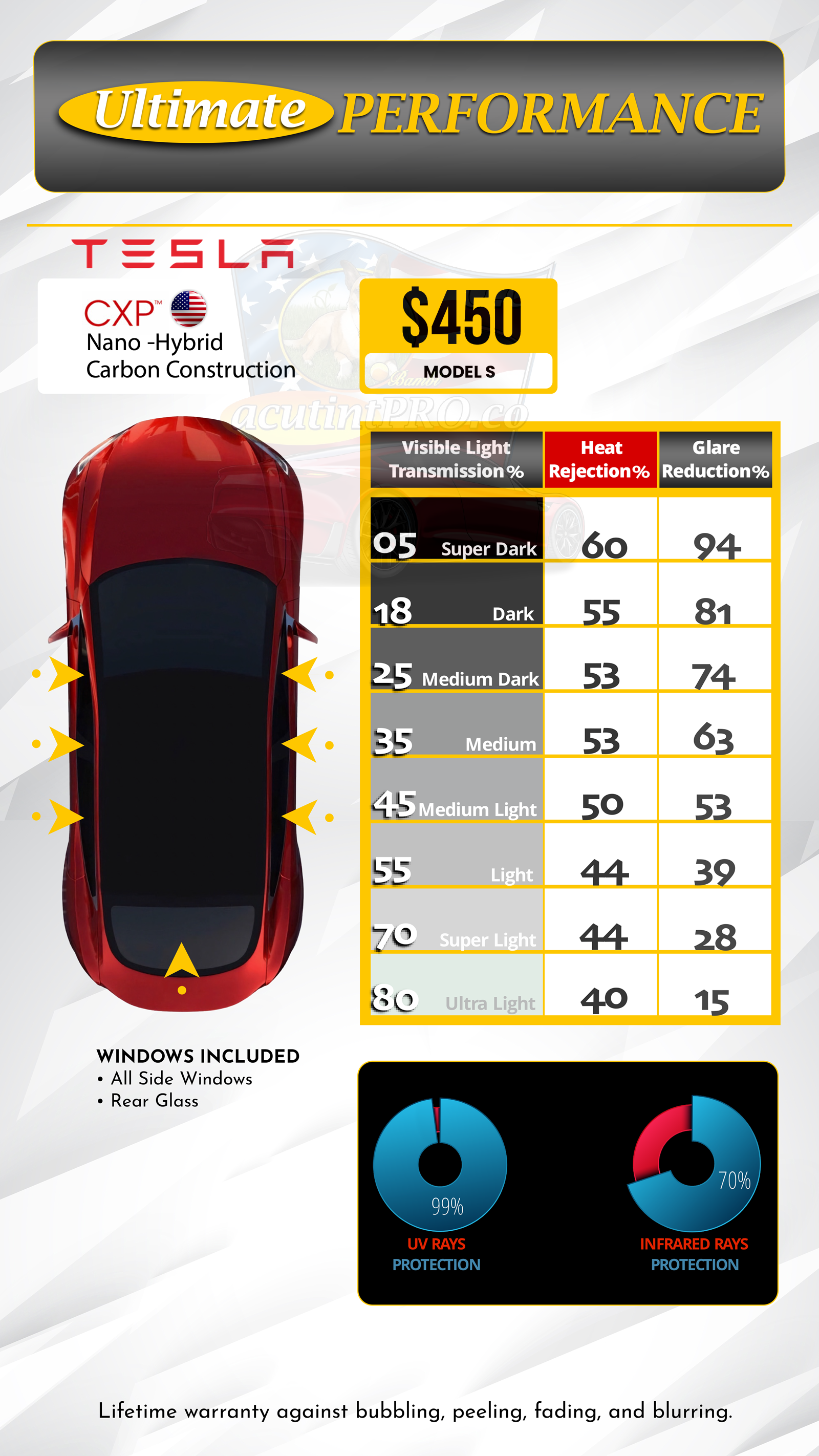
We Offer The Top 4 Performance Grades For BEST Customer Satisfaction
Why We Don't Carry Standard Films (Dye)
Almost everyone has seen window films that have turned purple and/or bubbled from exposure to the sun. Standard films are dyed material - not only do they fade over time, it also rejects the least amount of heat, and would absorb some heat into the vehicle, rather than reflect it back. Dyed films are the most cost effective option in the beginning, but have the shortest life span due to its fading, bubbling, peeling and only covers limited warranty. Over time it may end up being the most expensive as it needs to be replaced.

Proprietary Ceramic HeatResist™ Nanoparticle Construction
Evolve premium ceramic film technology takes solar blocking performance to a new SunTek level. They provide a greater degree of infrared rejection without dyes, metal, or carbon. Innovative HeatResist™ nanoparticle technology delivers up to 94% IR rejection for our highest heat protection. Over 99% UV protection along with glare protection, helps safeguard against skin damage, interior fading, and eye fatigue. 100% non-metal- clear signal connectivity.
HeatResist™ Technology
The proprietary construction features a layer of ceramic nanoparticles, imperceptible to the eye. This enables our next-level window tint to target and helps block one of the primary sources of overheated interiors—infrared heat. As our best window tint, Evolve filters up to 94% of these IR rays to help maintain cooler temperatures in your vehicle.

Nano-Ceramic Construction CeramicIR™
CIR is produced with a layer containing ceramic nanoparticles, invisible to the human eye. Through ceramic non-metal technology, these particles help CIR offer enhanced levels of solar performance and UV ray protection. Outstanding heat and infrared rejection, glare reduction and UV protection. 100% non-metal clear signal connectivity.

Nano-Hybrid Carbon Construction CXP™
CXP nano-carbon window tint is a perfect economical option to ceramic tint for solar performance and infrared rejection. Non-metal nano-hybrid carbon construction helps ensure color stability and clear signal connectivity while creating a distinctive non-reflective appearance.

Carbon Construction carbon™
Carbon films are manufactured with carbon particles rather than simple dyes, which perform at a level above dyed tint products. SunTek carbon tint helps maintain cooler vehicle interiors and will not change color like some dyed films. The carbon component helps block heat and damaging UV rays.

© 2025 AcutintPRO. All Rights Reserved.
What is Ultraviolet Radiation?
Ultraviolet (UV) radiation is a type of energy produced by the sun. The sun's UV rays can reach a person three ways: directly from the sun; scattered from the open sky; and reflected by the enviornment.

What is Infrared?
Infrared (IR), sometimes called infrared light, is an electromagnetic radiation with wavelengths longer than those of visible lights, invisible to the human eye and perceived as heat. Infraredwaves transmit large amounts of energy defined as heat in a short time without direct contact.

What is the difference between Ultraviolet (UV) and Infrared (IR)?
Infrared is the heat you feel in the sun and UV is the burn you get in the sun. Infrared feels hot because we sense it is heat, and because when we feel heat its heat, there is a lot of radiation, which makes up for its lower energy content. We don't feel ultraviolet radiation, which is usually less abundant, at least until we get a sunburn.

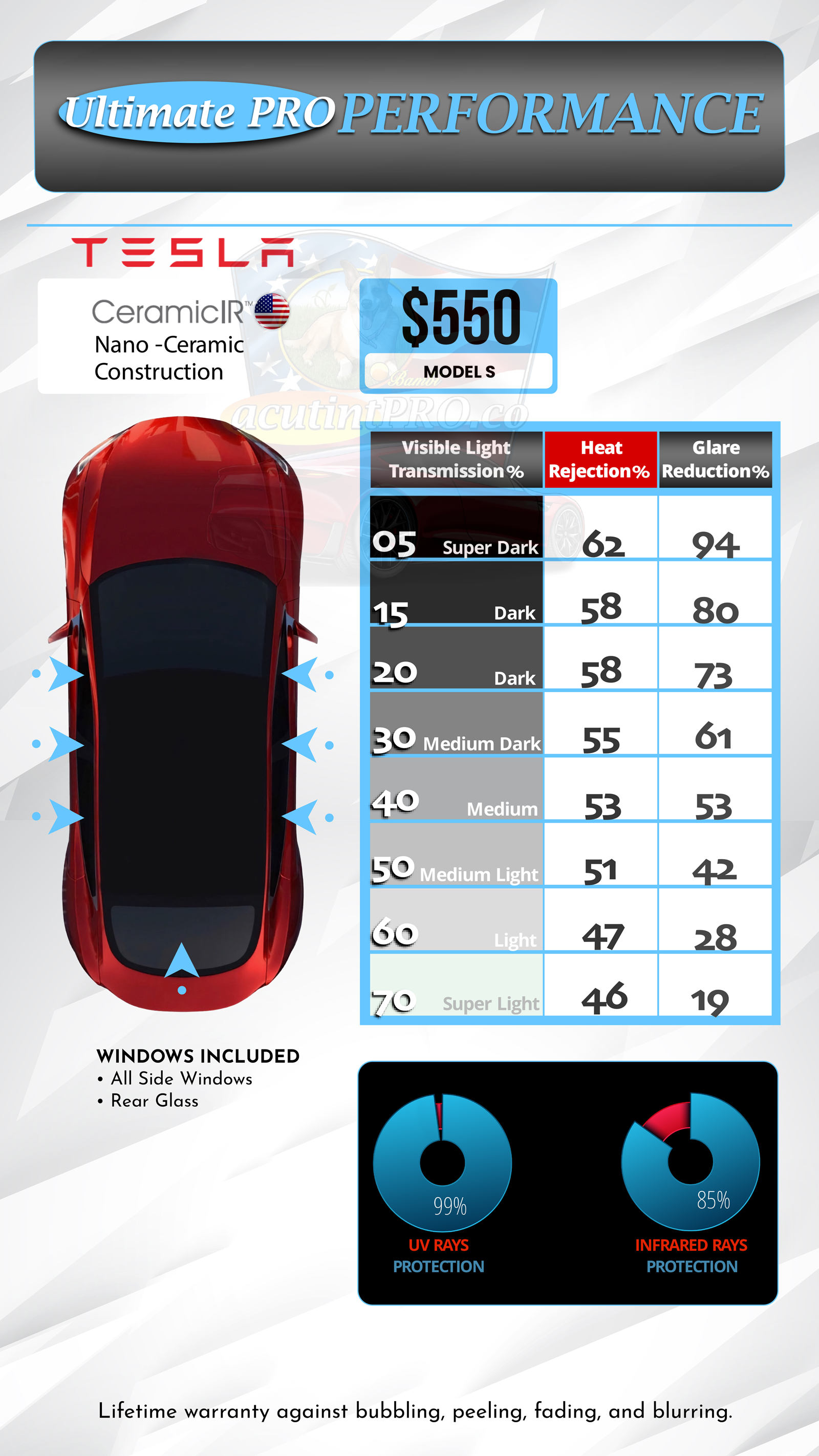
We Offer The Top 4 Performance Grades For BEST Customer Satisfaction
Why We Don't Carry Standard Films (Dye)
Almost everyone has seen window films that have turned purple and/or bubbled from exposure to the sun. Standard films are dyed material - not only do they fade over time, it also rejects the least amount of heat, and would absorb some heat into the vehicle, rather than reflect it back. Dyed films are the most cost effective option in the beginning, but have the shortest life span due to its fading, bubbling, peeling and only covers limited warranty. Over time it may end up being the most expensive as it needs to be replaced.

Proprietary Ceramic HeatResist™ Nanoparticle Construction
Evolve premium ceramic film technology takes solar blocking performance to a new SunTek level. They provide a greater degree of infrared rejection without dyes, metal, or carbon. Innovative HeatResist™ nanoparticle technology delivers up to 94% IR rejection for our highest heat protection. Over 99% UV protection along with glare protection, helps safeguard against skin damage, interior fading, and eye fatigue. 100% non-metal- clear signal connectivity.
HeatResist™ Technology
The proprietary construction features a layer of ceramic nanoparticles, imperceptible to the eye. This enables our next-level window tint to target and helps block one of the primary sources of overheated interiors—infrared heat. As our best window tint, Evolve filters up to 94% of these IR rays to help maintain cooler temperatures in your vehicle.

Nano-Ceramic Construction CeramicIR™
CIR is produced with a layer containing ceramic nanoparticles, invisible to the human eye. Through ceramic non-metal technology, these particles help CIR offer enhanced levels of solar performance and UV ray protection. Outstanding heat and infrared rejection, glare reduction and UV protection. 100% non-metal clear signal connectivity.

Nano-Hybrid Carbon Construction CXP™
CXP nano-carbon window tint is a perfect economical option to ceramic tint for solar performance and infrared rejection. Non-metal nano-hybrid carbon construction helps ensure color stability and clear signal connectivity while creating a distinctive non-reflective appearance.

Carbon Construction carbon™
Carbon films are manufactured with carbon particles rather than simple dyes, which perform at a level above dyed tint products. SunTek carbon tint helps maintain cooler vehicle interiors and will not change color like some dyed films. The carbon component helps block heat and damaging UV rays.

© 2025 AcutintPRO. All Rights Reserved.
What is Ultraviolet Radiation?
Ultraviolet (UV) radiation is a type of energy produced by the sun. The sun's UV rays can reach a person three ways: directly from the sun; scattered from the open sky; and reflected by the enviornment.

What is Infrared?
Infrared (IR), sometimes called infrared light, is an electromagnetic radiation with wavelengths longer than those of visible lights, invisible to the human eye and perceived as heat. Infraredwaves transmit large amounts of energy defined as heat in a short time without direct contact.

What is the difference between Ultraviolet (UV) and Infrared (IR)?
Infrared is the heat you feel in the sun and UV is the burn you get in the sun. Infrared feels hot because we sense it is heat, and because when we feel heat its heat, there is a lot of radiation, which makes up for its lower energy content. We don't feel ultraviolet radiation, which is usually less abundant, at least until we get a sunburn.

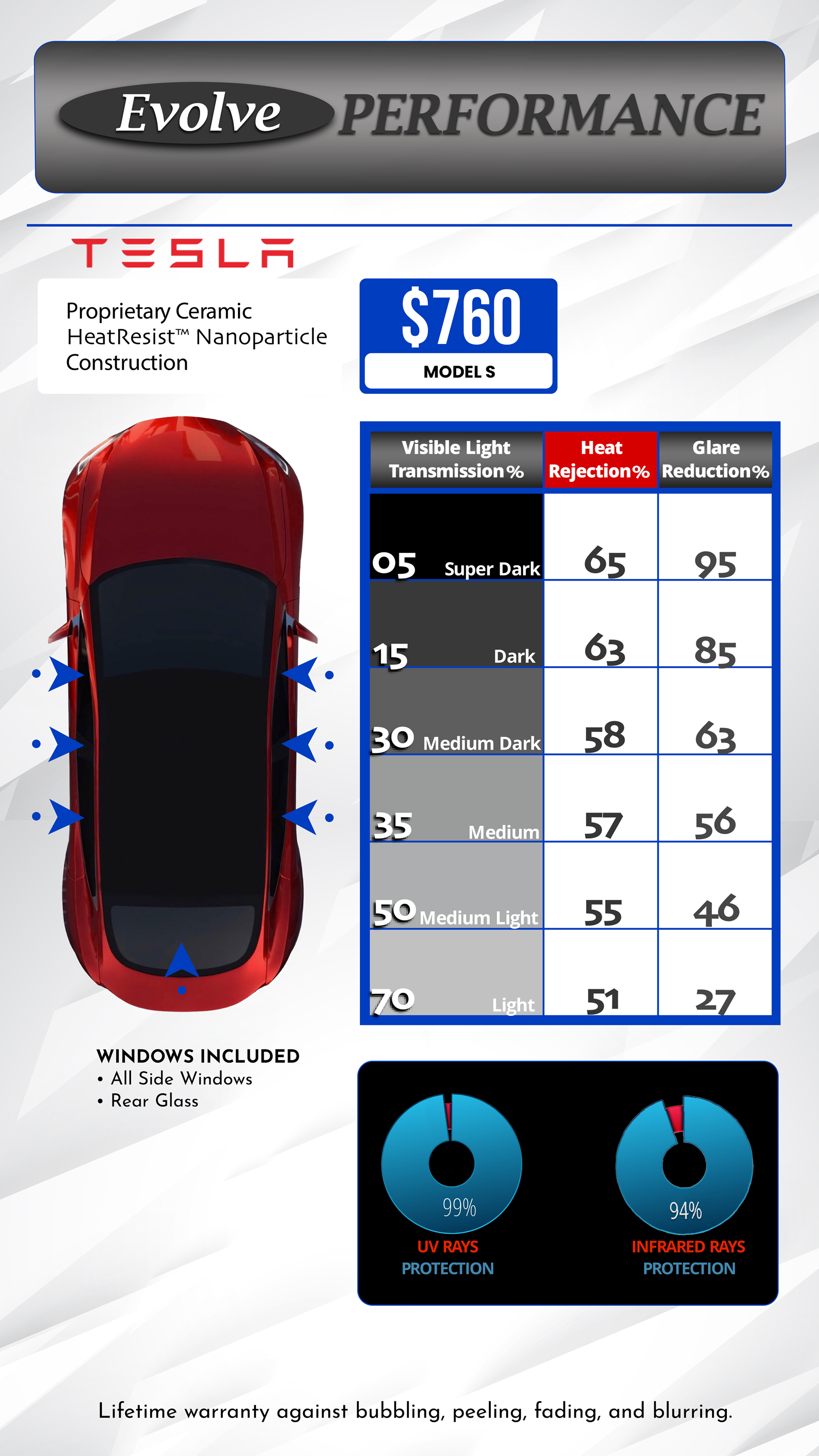
We Offer The Top 4 Performance Grades For BEST Customer Satisfaction
Why We Don't Carry Standard Films (Dye)
Almost everyone has seen window films that have turned purple and/or bubbled from exposure to the sun. Standard films are dyed material - not only do they fade over time, it also rejects the least amount of heat, and would absorb some heat into the vehicle, rather than reflect it back. Dyed films are the most cost effective option in the beginning, but have the shortest life span due to its fading, bubbling, peeling and only covers limited warranty. Over time it may end up being the most expensive as it needs to be replaced.

Proprietary Ceramic HeatResist™ Nanoparticle Construction
Evolve premium ceramic film technology takes solar blocking performance to a new SunTek level. They provide a greater degree of infrared rejection without dyes, metal, or carbon. Innovative HeatResist™ nanoparticle technology delivers up to 94% IR rejection for our highest heat protection. Over 99% UV protection along with glare protection, helps safeguard against skin damage, interior fading, and eye fatigue. 100% non-metal- clear signal connectivity.
HeatResist™ Technology
The proprietary construction features a layer of ceramic nanoparticles, imperceptible to the eye. This enables our next-level window tint to target and helps block one of the primary sources of overheated interiors—infrared heat. As our best window tint, Evolve filters up to 94% of these IR rays to help maintain cooler temperatures in your vehicle.

Nano-Ceramic Construction CeramicIR™
CIR is produced with a layer containing ceramic nanoparticles, invisible to the human eye. Through ceramic non-metal technology, these particles help CIR offer enhanced levels of solar performance and UV ray protection. Outstanding heat and infrared rejection, glare reduction and UV protection. 100% non-metal clear signal connectivity.

Nano-Hybrid Carbon Construction CXP™
CXP nano-carbon window tint is a perfect economical option to ceramic tint for solar performance and infrared rejection. Non-metal nano-hybrid carbon construction helps ensure color stability and clear signal connectivity while creating a distinctive non-reflective appearance.

Carbon Construction carbon™
Carbon films are manufactured with carbon particles rather than simple dyes, which perform at a level above dyed tint products. SunTek carbon tint helps maintain cooler vehicle interiors and will not change color like some dyed films. The carbon component helps block heat and damaging UV rays.

© 2025 AcutintPRO. All Rights Reserved.
What is Ultraviolet Radiation?
Ultraviolet (UV) radiation is a type of energy produced by the sun. The sun's UV rays can reach a person three ways: directly from the sun; scattered from the open sky; and reflected by the enviornment.

What is Infrared?
Infrared (IR), sometimes called infrared light, is an electromagnetic radiation with wavelengths longer than those of visible lights, invisible to the human eye and perceived as heat. Infraredwaves transmit large amounts of energy defined as heat in a short time without direct contact.

What is the difference between Ultraviolet (UV) and Infrared (IR)?
Infrared is the heat you feel in the sun and UV is the burn you get in the sun. Infrared feels hot because we sense it is heat, and because when we feel heat its heat, there is a lot of radiation, which makes up for its lower energy content. We don't feel ultraviolet radiation, which is usually less abundant, at least until we get a sunburn.

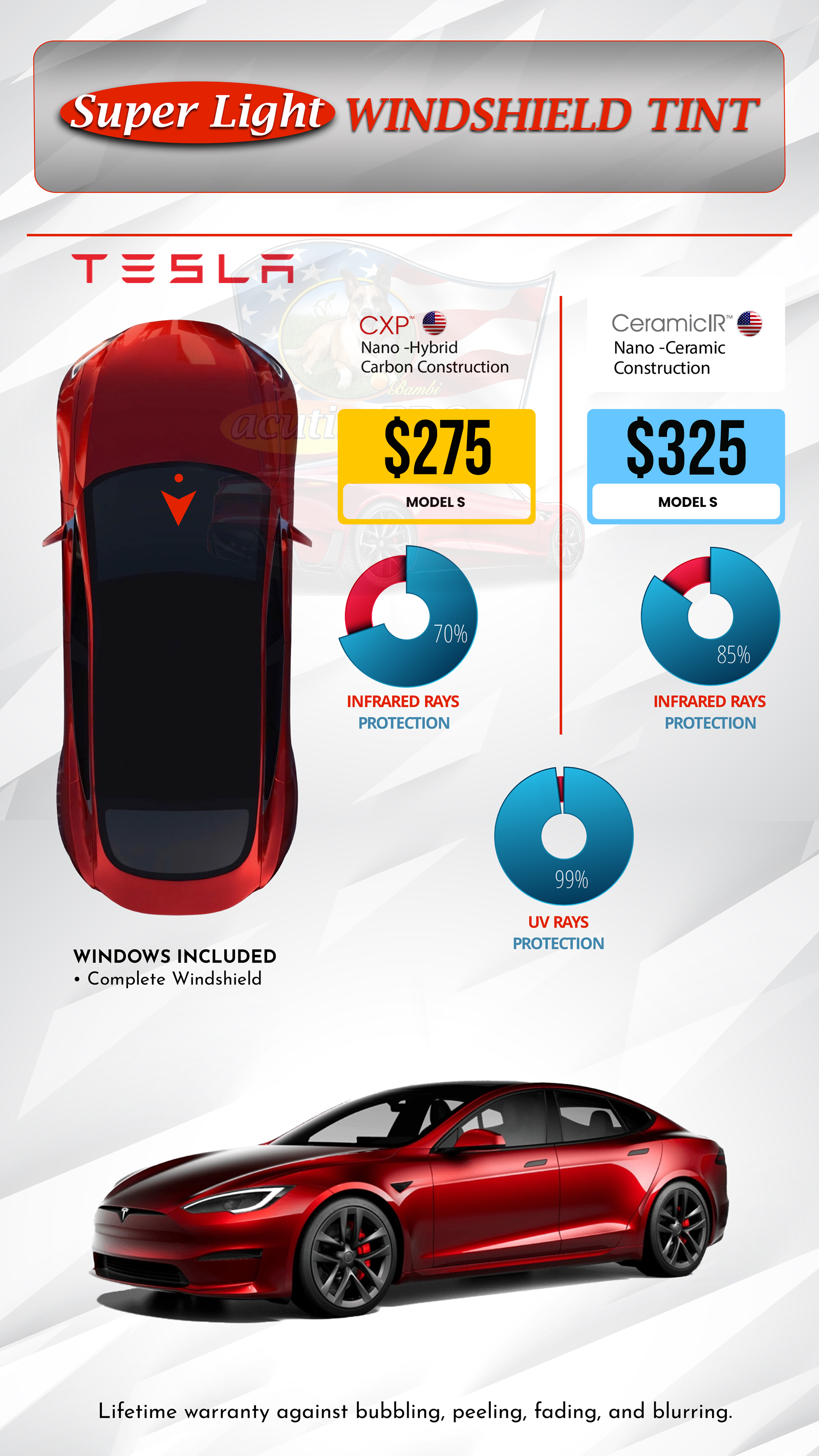
We Offer The Top 4 Performance Grades For BEST Customer Satisfaction
Why We Don't Carry Standard Films (Dye)
Almost everyone has seen window films that have turned purple and/or bubbled from exposure to the sun. Standard films are dyed material - not only do they fade over time, it also rejects the least amount of heat, and would absorb some heat into the vehicle, rather than reflect it back. Dyed films are the most cost effective option in the beginning, but have the shortest life span due to its fading, bubbling, peeling and only covers limited warranty. Over time it may end up being the most expensive as it needs to be replaced.

Proprietary Ceramic HeatResist™ Nanoparticle Construction
Evolve premium ceramic film technology takes solar blocking performance to a new SunTek level. They provide a greater degree of infrared rejection without dyes, metal, or carbon. Innovative HeatResist™ nanoparticle technology delivers up to 94% IR rejection for our highest heat protection. Over 99% UV protection along with glare protection, helps safeguard against skin damage, interior fading, and eye fatigue. 100% non-metal- clear signal connectivity.
HeatResist™ Technology
The proprietary construction features a layer of ceramic nanoparticles, imperceptible to the eye. This enables our next-level window tint to target and helps block one of the primary sources of overheated interiors—infrared heat. As our best window tint, Evolve filters up to 94% of these IR rays to help maintain cooler temperatures in your vehicle.

Nano-Ceramic Construction CeramicIR™
CIR is produced with a layer containing ceramic nanoparticles, invisible to the human eye. Through ceramic non-metal technology, these particles help CIR offer enhanced levels of solar performance and UV ray protection. Outstanding heat and infrared rejection, glare reduction and UV protection. 100% non-metal clear signal connectivity.

Nano-Hybrid Carbon Construction CXP™
CXP nano-carbon window tint is a perfect economical option to ceramic tint for solar performance and infrared rejection. Non-metal nano-hybrid carbon construction helps ensure color stability and clear signal connectivity while creating a distinctive non-reflective appearance.

Carbon Construction carbon™
Carbon films are manufactured with carbon particles rather than simple dyes, which perform at a level above dyed tint products. SunTek carbon tint helps maintain cooler vehicle interiors and will not change color like some dyed films. The carbon component helps block heat and damaging UV rays.

© 2025 AcutintPRO. All Rights Reserved.
What is Ultraviolet Radiation?
Ultraviolet (UV) radiation is a type of energy produced by the sun. The sun's UV rays can reach a person three ways: directly from the sun; scattered from the open sky; and reflected by the enviornment.

What is Infrared?
Infrared (IR), sometimes called infrared light, is an electromagnetic radiation with wavelengths longer than those of visible lights, invisible to the human eye and perceived as heat. Infraredwaves transmit large amounts of energy defined as heat in a short time without direct contact.

What is the difference between Ultraviolet (UV) and Infrared (IR)?
Infrared is the heat you feel in the sun and UV is the burn you get in the sun. Infrared feels hot because we sense it is heat, and because when we feel heat its heat, there is a lot of radiation, which makes up for its lower energy content. We don't feel ultraviolet radiation, which is usually less abundant, at least until we get a sunburn.

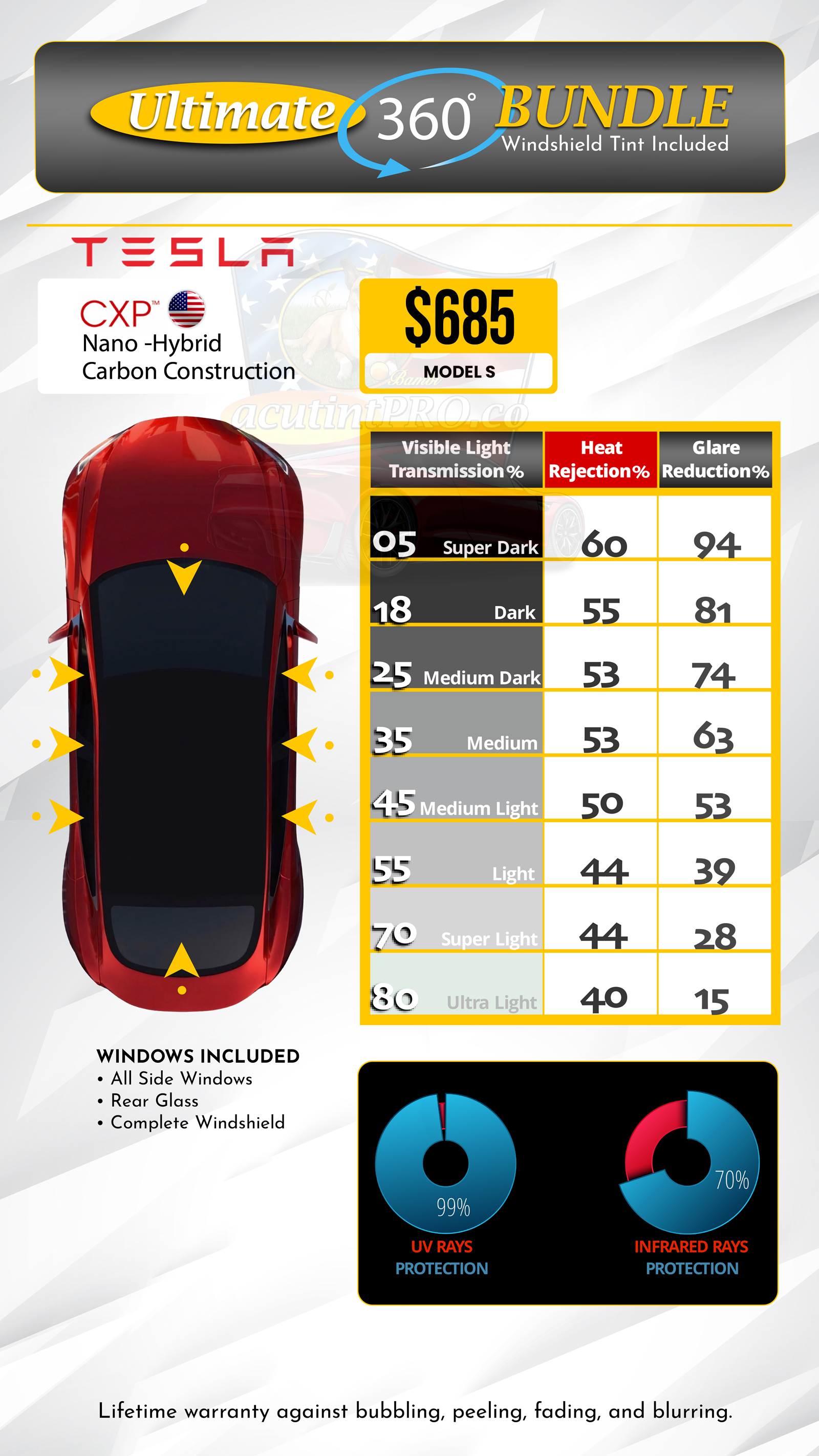
We Offer The Top 4 Performance Grades For BEST Customer Satisfaction
Why We Don't Carry Standard Films (Dye)
Almost everyone has seen window films that have turned purple and/or bubbled from exposure to the sun. Standard films are dyed material - not only do they fade over time, it also rejects the least amount of heat, and would absorb some heat into the vehicle, rather than reflect it back. Dyed films are the most cost effective option in the beginning, but have the shortest life span due to its fading, bubbling, peeling and only covers limited warranty. Over time it may end up being the most expensive as it needs to be replaced.

Proprietary Ceramic HeatResist™ Nanoparticle Construction
Evolve premium ceramic film technology takes solar blocking performance to a new SunTek level. They provide a greater degree of infrared rejection without dyes, metal, or carbon. Innovative HeatResist™ nanoparticle technology delivers up to 94% IR rejection for our highest heat protection. Over 99% UV protection along with glare protection, helps safeguard against skin damage, interior fading, and eye fatigue. 100% non-metal- clear signal connectivity.
HeatResist™ Technology
The proprietary construction features a layer of ceramic nanoparticles, imperceptible to the eye. This enables our next-level window tint to target and helps block one of the primary sources of overheated interiors—infrared heat. As our best window tint, Evolve filters up to 94% of these IR rays to help maintain cooler temperatures in your vehicle.

Nano-Ceramic Construction CeramicIR™
CIR is produced with a layer containing ceramic nanoparticles, invisible to the human eye. Through ceramic non-metal technology, these particles help CIR offer enhanced levels of solar performance and UV ray protection. Outstanding heat and infrared rejection, glare reduction and UV protection. 100% non-metal clear signal connectivity.

Nano-Hybrid Carbon Construction CXP™
CXP nano-carbon window tint is a perfect economical option to ceramic tint for solar performance and infrared rejection. Non-metal nano-hybrid carbon construction helps ensure color stability and clear signal connectivity while creating a distinctive non-reflective appearance.

Carbon Construction carbon™
Carbon films are manufactured with carbon particles rather than simple dyes, which perform at a level above dyed tint products. SunTek carbon tint helps maintain cooler vehicle interiors and will not change color like some dyed films. The carbon component helps block heat and damaging UV rays.

© 2025 AcutintPRO. All Rights Reserved.
What is Ultraviolet Radiation?
Ultraviolet (UV) radiation is a type of energy produced by the sun. The sun's UV rays can reach a person three ways: directly from the sun; scattered from the open sky; and reflected by the enviornment.

What is Infrared?
Infrared (IR), sometimes called infrared light, is an electromagnetic radiation with wavelengths longer than those of visible lights, invisible to the human eye and perceived as heat. Infraredwaves transmit large amounts of energy defined as heat in a short time without direct contact.

What is the difference between Ultraviolet (UV) and Infrared (IR)?
Infrared is the heat you feel in the sun and UV is the burn you get in the sun. Infrared feels hot because we sense it is heat, and because when we feel heat its heat, there is a lot of radiation, which makes up for its lower energy content. We don't feel ultraviolet radiation, which is usually less abundant, at least until we get a sunburn.

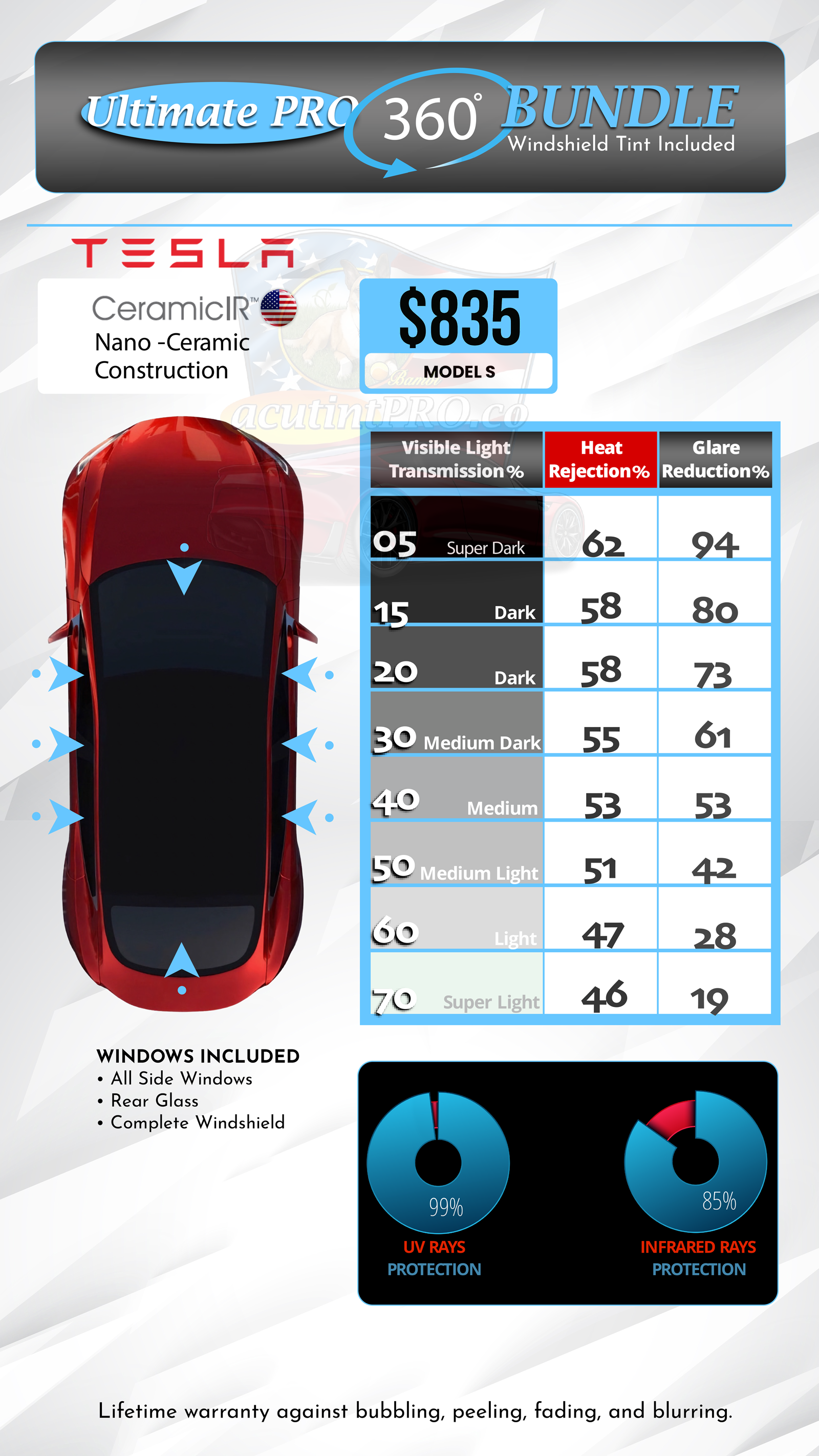
We Offer The Top 4 Performance Grades For BEST Customer Satisfaction
Why We Don't Carry Standard Films (Dye)
Almost everyone has seen window films that have turned purple and/or bubbled from exposure to the sun. Standard films are dyed material - not only do they fade over time, it also rejects the least amount of heat, and would absorb some heat into the vehicle, rather than reflect it back. Dyed films are the most cost effective option in the beginning, but have the shortest life span due to its fading, bubbling, peeling and only covers limited warranty. Over time it may end up being the most expensive as it needs to be replaced.

Proprietary Ceramic HeatResist™ Nanoparticle Construction
Evolve premium ceramic film technology takes solar blocking performance to a new SunTek level. They provide a greater degree of infrared rejection without dyes, metal, or carbon. Innovative HeatResist™ nanoparticle technology delivers up to 94% IR rejection for our highest heat protection. Over 99% UV protection along with glare protection, helps safeguard against skin damage, interior fading, and eye fatigue. 100% non-metal- clear signal connectivity.
HeatResist™ Technology
The proprietary construction features a layer of ceramic nanoparticles, imperceptible to the eye. This enables our next-level window tint to target and helps block one of the primary sources of overheated interiors—infrared heat. As our best window tint, Evolve filters up to 94% of these IR rays to help maintain cooler temperatures in your vehicle.

Nano-Ceramic Construction CeramicIR™
CIR is produced with a layer containing ceramic nanoparticles, invisible to the human eye. Through ceramic non-metal technology, these particles help CIR offer enhanced levels of solar performance and UV ray protection. Outstanding heat and infrared rejection, glare reduction and UV protection. 100% non-metal clear signal connectivity.

Nano-Hybrid Carbon Construction CXP™
CXP nano-carbon window tint is a perfect economical option to ceramic tint for solar performance and infrared rejection. Non-metal nano-hybrid carbon construction helps ensure color stability and clear signal connectivity while creating a distinctive non-reflective appearance.

Carbon Construction carbon™
Carbon films are manufactured with carbon particles rather than simple dyes, which perform at a level above dyed tint products. SunTek carbon tint helps maintain cooler vehicle interiors and will not change color like some dyed films. The carbon component helps block heat and damaging UV rays.

© 2025 AcutintPRO. All Rights Reserved.
What is Ultraviolet Radiation?
Ultraviolet (UV) radiation is a type of energy produced by the sun. The sun's UV rays can reach a person three ways: directly from the sun; scattered from the open sky; and reflected by the enviornment.

What is Infrared?
Infrared (IR), sometimes called infrared light, is an electromagnetic radiation with wavelengths longer than those of visible lights, invisible to the human eye and perceived as heat. Infraredwaves transmit large amounts of energy defined as heat in a short time without direct contact.

What is the difference between Ultraviolet (UV) and Infrared (IR)?
Infrared is the heat you feel in the sun and UV is the burn you get in the sun. Infrared feels hot because we sense it is heat, and because when we feel heat its heat, there is a lot of radiation, which makes up for its lower energy content. We don't feel ultraviolet radiation, which is usually less abundant, at least until we get a sunburn.

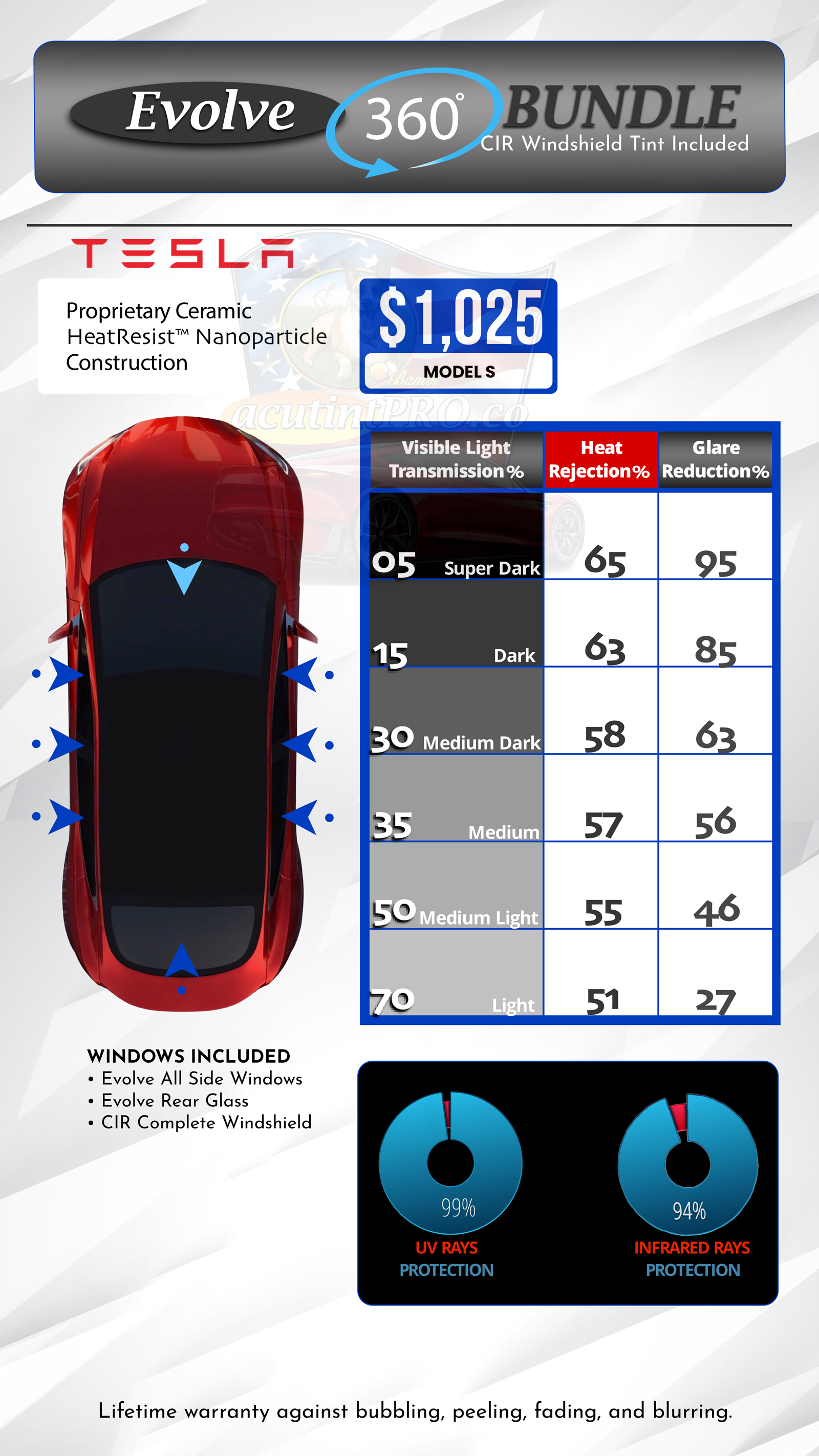
We Offer The Top 4 Performance Grades For BEST Customer Satisfaction
Why We Don't Carry Standard Films (Dye)
Almost everyone has seen window films that have turned purple and/or bubbled from exposure to the sun. Standard films are dyed material - not only do they fade over time, it also rejects the least amount of heat, and would absorb some heat into the vehicle, rather than reflect it back. Dyed films are the most cost effective option in the beginning, but have the shortest life span due to its fading, bubbling, peeling and only covers limited warranty. Over time it may end up being the most expensive as it needs to be replaced.

Proprietary Ceramic HeatResist™ Nanoparticle Construction
Evolve premium ceramic film technology takes solar blocking performance to a new SunTek level. They provide a greater degree of infrared rejection without dyes, metal, or carbon. Innovative HeatResist™ nanoparticle technology delivers up to 94% IR rejection for our highest heat protection. Over 99% UV protection along with glare protection, helps safeguard against skin damage, interior fading, and eye fatigue. 100% non-metal- clear signal connectivity.
HeatResist™ Technology
The proprietary construction features a layer of ceramic nanoparticles, imperceptible to the eye. This enables our next-level window tint to target and helps block one of the primary sources of overheated interiors—infrared heat. As our best window tint, Evolve filters up to 94% of these IR rays to help maintain cooler temperatures in your vehicle.

Nano-Ceramic Construction CeramicIR™
CIR is produced with a layer containing ceramic nanoparticles, invisible to the human eye. Through ceramic non-metal technology, these particles help CIR offer enhanced levels of solar performance and UV ray protection. Outstanding heat and infrared rejection, glare reduction and UV protection. 100% non-metal clear signal connectivity.

Nano-Hybrid Carbon Construction CXP™
CXP nano-carbon window tint is a perfect economical option to ceramic tint for solar performance and infrared rejection. Non-metal nano-hybrid carbon construction helps ensure color stability and clear signal connectivity while creating a distinctive non-reflective appearance.

Carbon Construction carbon™
Carbon films are manufactured with carbon particles rather than simple dyes, which perform at a level above dyed tint products. SunTek carbon tint helps maintain cooler vehicle interiors and will not change color like some dyed films. The carbon component helps block heat and damaging UV rays.

© 2025 AcutintPRO. All Rights Reserved.
What is Ultraviolet Radiation?
Ultraviolet (UV) radiation is a type of energy produced by the sun. The sun's UV rays can reach a person three ways: directly from the sun; scattered from the open sky; and reflected by the enviornment.

What is Infrared?
Infrared (IR), sometimes called infrared light, is an electromagnetic radiation with wavelengths longer than those of visible lights, invisible to the human eye and perceived as heat. Infraredwaves transmit large amounts of energy defined as heat in a short time without direct contact.

What is the difference between Ultraviolet (UV) and Infrared (IR)?
Infrared is the heat you feel in the sun and UV is the burn you get in the sun. Infrared feels hot because we sense it is heat, and because when we feel heat its heat, there is a lot of radiation, which makes up for its lower energy content. We don't feel ultraviolet radiation, which is usually less abundant, at least until we get a sunburn.

No part of this website's content, including images and graphics, may be reproduced or used without express written permission.
Our Highest Performing Ceramic Tint
Evolve Series
SunTek's next evolution in IR-blocking tint lets you stay ahead of the sun's harsh effects like stifling heat and distracting glare. Featuring proprietary HeatResist™ ceramic technology. Evolve automotive window film targets and helps block one of the main sources of uncomfortable interiors – infrared rays. With amped up heat rejection, our top tint series delivers comfort at every turn, every time you hit the road.
Cruise in cool, high style with custom tint options, all non-reflective with a neutral yet sleek appearance. Evolve is available in six shades and offers powerful protection against ultraviolet rays that can harm skin and damage interiors. Other premium benefits include a break for the A/C on the hottest of days, added safety and no signal interference.

Extreme Heat Rejection
Blocks up to 94% of infrared rays*, helping to prevent stifling vehicle cabins.

Over 99% UV** Protection
Protects against interior fading, helping to keep fabrics and dash looking new.

Added Safety
Helps increase safety with reduced glare, shattered glass protection and added privacy.

A/C Relief
Lessens the need for A/C, helping to improve fuel efficiency or electric car range.
*** WINDOW TINTING INFO ***
Tinting the side and rear windows help lower the temperature inside your vehicle. The front windshield is typically the largest window of the car and will allow the most heat to enter into your vehicle's interior. Since tint shading can interfere with one's view, windshield tinting has not really been allowed. But with Nano-Hybrid Carbon Construction Technology, this almost clear film makes it possible.
The Ultra Light Performance windshield film offers high clarity for unaltered visibility and safe driving. This film will block 44% heat and over 99% UV rays of damaging and harmful ultraviolet light. It will also help protect your vehicle's interior from fading and assist in the prevention of premature skin aging.
A device to measure heat, called a BTU meter, can demonstrate the difference between a non-tinted windshield versus one that has been tinted with the Nano-Hybrid Carbon film. The difference has been proven to be dramatic – the non-tinted windshield registered close to 285BTU, while the tinted version came below 100BTU.
The very light, almost clear shade of tint creates no visible difference in the look of the window and will not impair day or night time vision. What you will experience is an improved interior comfort due to the blocking of heat, and all while maintaining a factory look since the film is almost invisible.